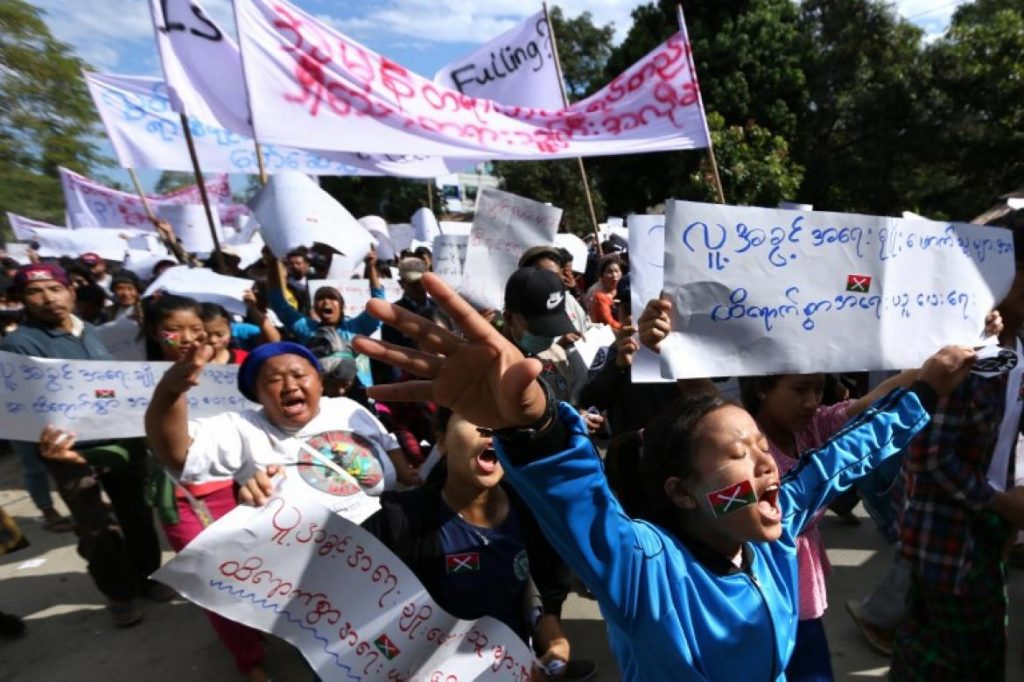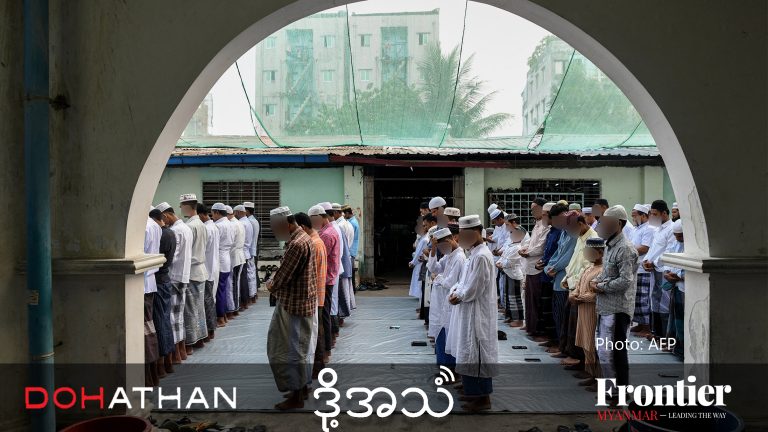By EMILY FISHBEIN | FRONTIER
MYITKYINA — Three Kachin community activists sentenced to six months’ imprisonment in December for defaming the Tatmadaw were honoured in absentia with the inaugural Kachin Human Rights Defender Award at a ceremony on Wednesday in Myitkyina.
The activists, Nang Pu, Lum Zawng and Zau Jat, were sentenced on December 7 to six months in prison and fined K500,000 each under section 500 of the Penal Code for their role in leading peaceful demonstrations in Myitkyina last April. Human rights groups have decried the ruling as an attack on freedom of speech and assembly.
Several thousand people demonstrated in April and early May on behalf of IDPs who were trapped in Tanai Township during a period of escalated fighting between the Kachin Independence Army and the Tatmadaw. The protesters called for the safe passage of the IDPs and for humanitarian access to conflict-affected areas.
About 100,000 displaced people are living in camps in Kachin State as a result of fighting between the KIA and the Tatmadaw, according to the UN Office for the Coordination of Humanitarian Affairs, after a 17-year ceasefire broke down in 2011.
Support more independent journalism like this. Sign up to be a Frontier member.
The Kachin Human Rights Defender Award was provided by the World Kachin Congress and the Kachin Consultative Group, and presented at the Kachin National Manau Park. The award is named after the mushe, a Kachin legendary spirit that stood up for truth and justice.
According to Sut Seng Htoi, a member of the Kachin Youth Movement Steering Committee, Nang Pu, Lum Zawng and Zau Jat were selected for the award to acknowledge that their imprisonment was unjust, to recognise their humanitarian work, and to empower other youth activists.
Another steering committee member, Seng Hkum, said, “This award doesn’t just recognise the sacrifice made by the three recipients in their fight for justice, and their courage; it is also meant to inspire other young people”.
On Thursday, Neng Pu will also receive the Schuman Award, which is issued to three people annually by the European Union in Myanmar, for her engagement in defence of democracy, the rule of law and human rights.
Undeterred
The Kachin Human Rights Defender Award is supported by two groups that seek to raise awareness about Kachin issues. The World Kachin Congress is a network of individuals from the Kachin diaspora, and the Kachin National Consultative Assembly is a network of prominent Kachin leaders, whose purpose is to facilitate political processes and develop a platform for dialogue.
Organisers said that one aim of the award is to highlight the numerous human rights challenges in Kachin State, where humanitarian access to IDPs is often restricted, and where human rights defenders risk arrest, most often under section 17(1) of the Unlawful Associations Act, and section 500 of the Penal Code for defamation.
Francis Zau Tu, program director of the Myitkyina-based Humanity Institute think tank, said that those engaged in human rights work in Kachin State are closely watched by the military.
“Freedom of expression is very limited, especially in rural areas,” he said. “We have to think carefully about what we say and post online. We cannot criticise the government. The current culture of impunity is a hindrance to promoting and protecting human rights.”
As well as reaching a local audience, the award sought to raise awareness in the international community about the flawed judicial system in Myanmar and the steps still needed toward achieving a full federal democracy in which all people have freedom of expression and their basic rights are met.
“It is important for the international community to know what is happening in Kachin State,” Francis Zau Tu said. “If we shut our mouths, we cannot achieve our freedom and our rights.”
If the intention behind imprisoning the three activists was to deter others in Kachin State, for many it has had the opposite effect, Seng Hkum said.
“The Tatmadaw might have tried to frighten people by imprisoning these three activists, but they were mistaken. Now we, the people, are more inspired. The Tatmadaw tried to bring us down, but we will keep going. They cannot shut us down.”
Ko Paw Lu, leader of the Ram Hkye Youth Rescue Network, said he stood in solidarity with the imprisoned activists. “We as youth are not afraid. The activists who were arrested were working for the truth; we know they didn’t make a mistake. We will keep moving forward.”
During Wednesday’s ceremony, family members of each of the activists were invited to receive the awards on their behalf. Jaw San Nu, the wife of Zau Jat, told Frontier, “My husband stands for all human rights defenders in Kachin State. I am proud of him and what he stands for.”
Asked what message he wanted to share with the public in relation to the award, Nang Pu’s father said, “Today, I wish for safety for all people in Myanmar and aid to all people in need.”







